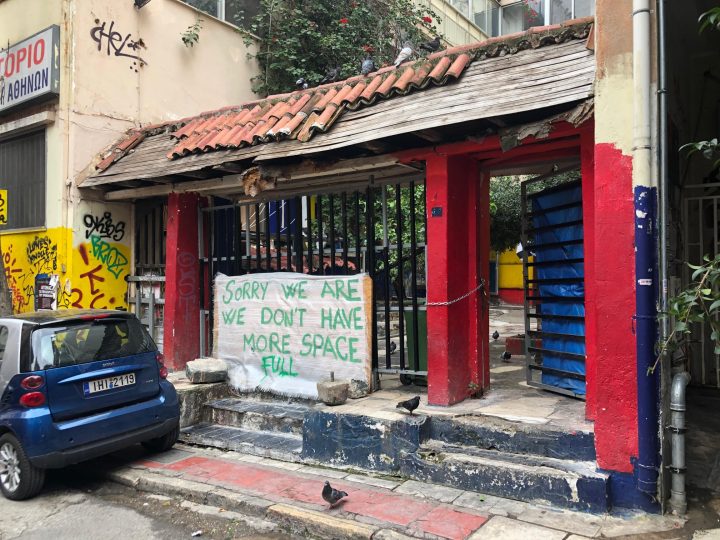In July of this year New Democracy came to power in Greece with a promise to crack down on immigration and the networks of solidarity surrounding refugees. In the last few weeks they have started to put this process into action suggesting that they are ‘cleaning up Exarcheia’, evicting the squats that many refugees have made their temporary home. This is just one of a number of rule changes that effects this particular district of Athens since the new government came into power in July. The first stage was to recommend legislation to end the academic sanctuary law, a law that protects students protesting and, for the most part, means academic campuses are out of bounds to police. This next stage will mean the attempted systematic emptying out of 23 refugee anarchist squats throughout the Exarcheia district of Athens, potentially making thousands of refugees homeless.
The Athens squats differ in their relationships with the authorities and in their history of attempted evictions as well as violent far right attacks, with some regularly threatened with eviction and attacks and others largely left alone. The squats also differ in their standards of accommodation, with many relying on the skills of residents to patch up plumbing and building work on these previously abandoned buildings. However, what many of them do have in common is a sense of community and solidarity in an environment where that is sadly lacking. This has led to a situation in which these squats have reached capacity, with some even running a waiting list system to be able to offer housing for refugees.
A system based on solidarity rather than charity, and especially one able to limit capacity often makes these reclaimed spaces a far more appealing prospect than the official camps. Official camps in Greece, both in Athens, but particularly on the island hotspots of Lesvos, Chios, Samos, Kos and Leros are full, far exceeding the capacity they were intended to house. As a result, many refugees find themselves housed in tents or makeshift shelters, queueing for many hours to access food and showers.
In stark contrast some of the Athens squats are able to provide spaces to cook fresh and nutritious food, kitchens where refugees, volunteers and activists living and volunteering in these spaces can work together to create healthy meals for one another. They are able to build a community, sometimes relying on their own spaces to offer activities (art, films, libraries and education), sometimes working with other groups to offer these opportunities. These acts of solidarity and community matter, they provide a welcome to people who have often had doors closed on them, who have been traumatised by the journeys they have taken up to now, they are an important and valuable space run entirely through donations and support and without the need for government or EU money. Yet they are also important on a practical level, they put a roof over the head of thousands of people, who, following the government’s proposed evictions could very easily find themselves homeless in the streets of Athens.
We only have to look at the example of Rome to understand the very real risks about what happens next after the squats are evicted. In 2017 evictions took place in Rome that then led to refugees living in tents in the centre of the city; there were subsequent protests and the police used water cannons to try to disperse people who had nowhere to go. These people found themselves homeless with very little support, the effects of these evictions still being felt by refugees in Rome today.
Squatting in both Athens and Rome is not a perfect system. The conditions in the squats are not always to the standards that we might hope for. However, these reclaimed spaces do provide people with an indoor space in which to live, the conditions are also often better than in official camps and reception centres where stories of rat bites, as well as a lack of food, water and shelter are common. They also rely on a model of solidarity that treats people with dignity and respect, that welcomes people in and treats them not as numbers but as human beings. The eviction of the squats is one amongst a number of worrying policies which will impact upon the lives of refugees suggested by the new Greek government. Whilst protests against these decisions will continue on the ground, it is also important that the broader international community does not turn its back on refugees, many of whom are fleeing persecution and war, who now face being made homeless in the streets of Europe.






